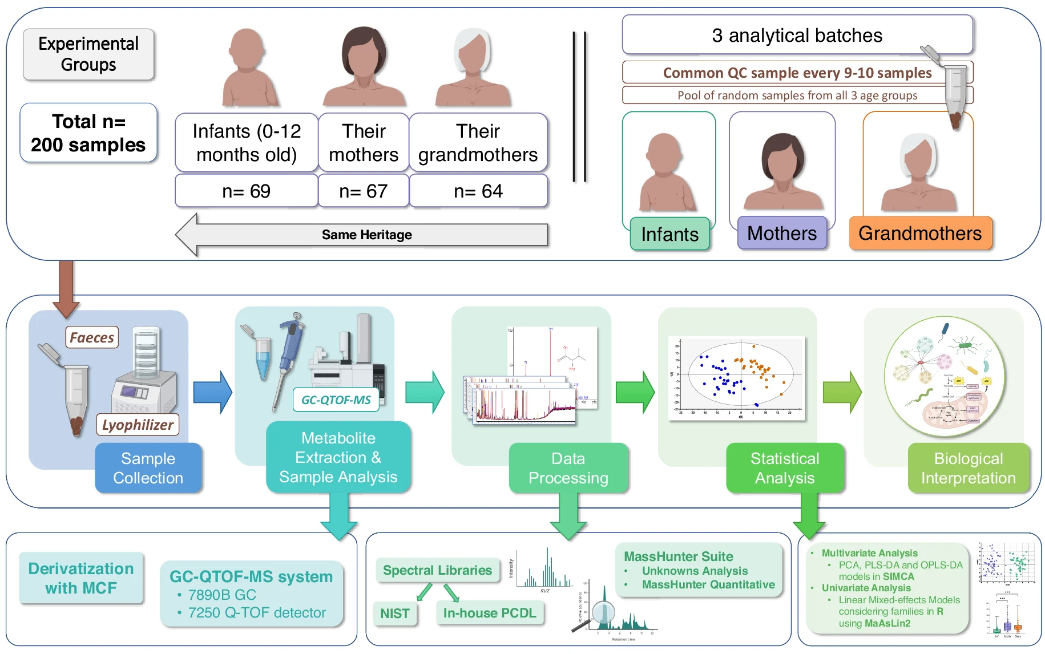The human gut microbiome plays a crucial role in health and disease, with early development being particularly influential. Dysregulation of the gut microbiota during infancy can lead to pathologies later in life. In this pioneering multi-omics study, researchers investigated the early development of the gut microbiota across three generations of family members, providing valuable insights into the establishment and maturation of the gut microbiome.
Methods: Fecal samples from 200 individuals, including infants (0-12 months old), mothers, and grandmothers, were analyzed using two independent metabolomics platforms (gas chromatography and capillary electrophoresis coupled to mass spectrometry) and metagenomics (16S rRNA gene sequencing and shotgun sequencing).
Key Findings:
- Microbiota Composition and Diversity:
- Infants exhibit significantly different fecal microbiota populations compared to adults, with lower diversity.
- Bacterial populations associated with short- and branched-chain fatty acids show shifts in abundance between infants and adults.
- Metabolite Differences:
- Infants show distinct metabolite profiles compared to adults, particularly in fatty acid classes such as monounsaturated fatty acids (MUFA) and polyunsaturated fatty acids (PUFA).
- PUFA levels decrease in adults compared to infants, possibly due to higher lipid peroxidation, while MUFA levels correlate with longevity.
- Age-related changes in energetic and biosynthetic pathways, including the tricarboxylic acid (TCA) cycle, are observed, possibly influenced by the gut microbiota.
- Tryptophan Metabolism:
- Tryptophan metabolism shows age-related changes, with an upregulation of catabolism pathways with increasing age.
- Tryptophan and its metabolites act as aryl hydrocarbon receptor (AhR) ligands, regulating inflammation and intestinal homeostasis.
- Short-Chain Fatty Acids (SCFAs) and Branched-Chain Fatty Acids (BCFAs):
- Infants, primarily breastfed, show higher levels of acetic acid (a short-chain fatty acid) associated with 𝘉𝘪𝘧𝘪𝘥𝘰𝘣𝘢𝘤𝘵𝘦𝘳𝘪𝘶𝘮 abundance.
- Adults exhibit increased levels of longer-chain SCFAs and BCFAs, reflecting differences in microbiota composition and diet.
- Polyamines:
- Levels of polyamines decrease with age, with potential implications for cell proliferation and longevity.
- Probiotic 𝘉𝘪𝘧𝘪𝘥𝘰𝘣𝘢𝘤𝘵𝘦𝘳𝘪𝘶𝘮 strains may play a role in polyamine production, suggesting a link between microbiota composition and longevity.
Strengths and Limitations:
- Strengths include the multi-generational sample collection, broad epidemiological variables obtained, and rigorous analysis using state-of-the-art omics methodologies.
- Limitations include the cross-sectional nature of the study and confounding effects of diet and aging.
Link to the study : https://tinyurl.com/e336nwzu
